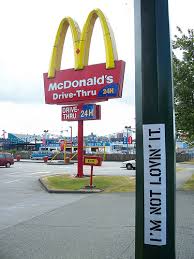By Eric Scott Pickard
Well, here’s yet another reason why I, personally, won’t be setting foot inside what the folks at McDonald’s laughably call a “restaurant” anytime soon.
Apparently, McDonald’s, the vast fast food giant known for extraordinarily cheap, unappetizing “food,” may have a policy that prevents employees from serving the homeless, and even prevents customers from purchasing food for those who are homeless. Take this story, in which a man visiting a McDonald’s in Manchester, UK was forced to convince the manager that he was, in fact, not homeless. Mind you, this fellow had money in hand; it was the possibility that he might not have a bed waiting for him somewhere that was in question, a puzzling distinction in a capitalist transaction. In that same location, a young woman wished to purchase a “sandwich” for a homeless man whom she had seen on her way down the street, and was refused service due to the “company policy” that prevents McDonald’s from serving the homeless. You will note that the McDonald’s corporation denies having any such policy, chalking these incidents up to a (at best) cranky or (at worst) an actively cold-hearted manager.
The problem with that narrative, however, is that if you look around, you will find other, similar incidents all over the place. In addition, McDonald’s was recently the target of a global petition regarding their use of the particularly cruel homeless spikes, metal studs designed to prevent people from sleeping in public spaces. The company claims that these spikes were installed to “prevent anti-social behavior.” Leaving aside for the moment that McDonald’s considers itself the arbiter of what is socially acceptable behavior, what exactly are they trying to prevent with these spikes? Sleeping? Sleeping may be an essentially solitary endeavor, but I wouldn’t call it anti-social.
No, the problem here is far deeper, and it certainly isn’t limited to McDonald’s. The problem is the capitalists’ profound and bizarre hatred of the poor and oppressed. The rationale goes thus: the homeless, they stand outside businesses, asking for money, and they scare off customers. They might be drunk or insane and they could be a danger. They are bad for business, so get rid of them. The bottom line is the bottom line: if something is bad for business – even a HUMAN BEING, mind you – then it is worthless and must be removed. This is the amoral logic of the market. The poorest among us are an unpleasant reminder of the fact that we all are getting screwed; when you walk past a homeless individual on your way into a McDonald’s, perhaps you will start questioning the legitimacy of a system that produces a vast amount of cheap food and sells it at profit while people right outside starve. Now, that isn’t to say this is good food. It certainly isn’t, and is certainly utterly terrible for your health and well-being. But it is food – and denying food to the hungry is among the most reprehensible actions known to mankind. Food is a basic necessity and right, and to deny it is an obscenity. However, that is how capitalism and the consumerist model functions, and these policies serve to reinforce these ideals.
We shouldn’t be surprised at this; angry, yes, but surprised? These gigantic corporations dump poison in our watersheds, pour carbon into our air, bribe politicians to keep us from getting equal shares of our labor, sell us loans at vast amounts of interest, expose us to carcinogenic chemicals constantly, enslave children in sweatshops, pave over all our green space, and ask us to thank them for “creating jobs” that we must go to to afford to live in this absurd world they have created. Should we be surprised that they deny food to us when we end up on the streets? No.
So what do we do? Well, in the case of McDonald’s, they are already experiencing pushback. They have decided to close hundreds of stores due to sagging profits, spurred on by the fact that people have realized that their food is not “food” in the strictest sense of the word. As Arundhati Roy said, “the corporate revolution will collapse if we refuse to buy what they are selling.” Around the world, people have been forcing bans on companies like Monsanto, a corporation that I, even being a moral relativist in many ways, must call “evil.” The aforementioned petition is a great way to strike back, as well.
However, we must not limit ourselves to boycott, petition, and reform. To truly affect change, we must replace these entities, policies, and processes with something entirely new. We can strike back against McDonald’s by growing and preparing our own food, with our loved ones, in our communities. We can find organic, holistic, and innovative ways to grow and distribute food, clothing, and shelter to our fellow human beings, outside of the capitalist, consumerist model. So, yes, stop eating McDonald’s (for your taste buds and body fat index, if nothing else) but also be aware that any and all food that you don’t know the source of probably has some kind of oppression attached to it. I’m not wagging my finger; just be aware. As we all begin to wake up to the realities of the system we are in, we can end the nightmare and slip into a pleasant dream. Don’t be surprised. Be aware.
– Eric Scott Pickard is an activist, artist, and poet. He is a co-founder of Free Radical Media.
Image via Center for Social Inclusion.
–
